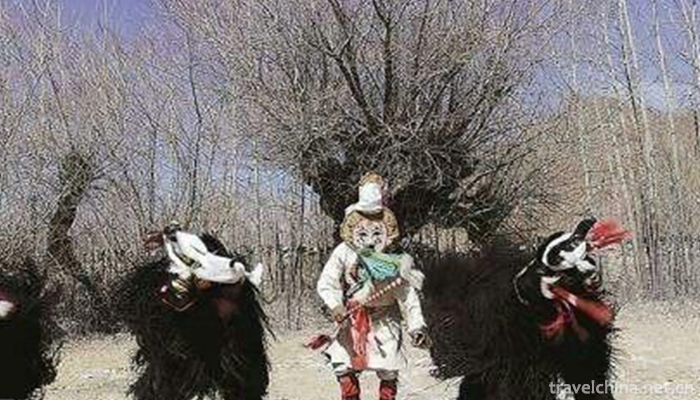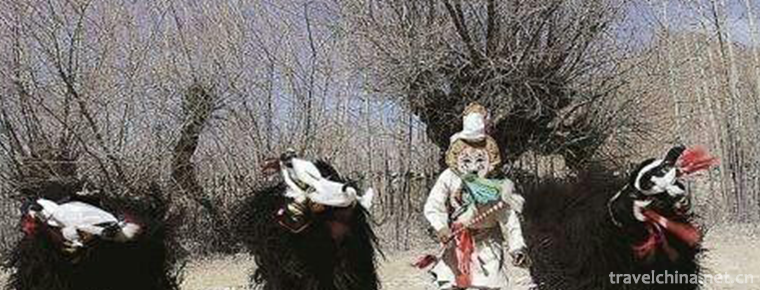Xie Rong Zhongzi
Xie Rong Zhongzi
Xierong Zhongzi still keeps the primitive and simple legacy, from which we can see the spiritual sustenance and aesthetic pursuit of Tibetan ancestors. This kind of primitive culture and art has become the "living fossil" to study the social, cultural and historical development of Tibet.
On May 23, 2011, Xierong Zhongzi was listed in the third batch of national intangible cultural heritage list by the State Council.
Current situation of inheritance
The earth is bright and beautiful in spring, peacocks sing softly and gently, and rainbows of five colors appear in the sky, flowers blossom everywhere... In this auspicious day, according to ancient traditions and customs, two bison from Xierong, together with me, wish a happy and auspicious life. This is the beginning of Xierong Zhongzi. "Ah Ge" is the leader of dance. In the clang of cymbals and drums with strong rhythm, "Ah Ge" and "six steps and one lift" appear. After a circle around the field, they stop in the middle. Then they say the above words rhythmically.
With the development of society, Xierong Zhongzi has been developing and changing in the long history. In response to this situation, Chas, the sixth generation successor of Xierong Zhongzi, said: "In the past, Xierong Zhongzi, a jumper, demanded to be powerful and strong, showing the tough character and characteristics of buffalo. When performing at various celebrations, some organizers demanded cheerfulness and intensity. In this way, there is no bison's character, but also lost its original style and characteristics. We don't like this kind of jumping, and the masses don't like it either."
Stylistic features
Xierong Zhongzi is closely related to Tibetan opera, which can be seen from clothing, props and singing tunes. The clothes worn during the performance of "Zhongzi" are Tibetan clothes, all of which are made of Shu Shu. Tao has Tibetan opera masks on cymbals, drums, Ah Ge's faces and "towers" (colorful flagpoles), cowhides on bulls and cows, and a pair of cow heads. Performers who play bulls and cows wear black clothes to match "cowhide".
Every year on the Shelton Festival, the "Zhongzi" performing team of Xierong Village takes part in Tibetan opera performance in Lhasa. Although the performance time is not too long, it is a necessary performing team. The main reason is that Xierong Zhongzi highlights blessings, auspiciousness and perfection. The "Zhongzi" performance team of Xierong Village not only performs at the village's Wangguo Festival, but also is invited to perform at various celebrations.


-
1.Jingpo Lake
Jingbo Lake: National AAAAA-level tourist attractions, World Geopark, National Key Scenic Spots, International Ecotourism Resort, National Civilized Scenic Spots Demonstration Sites
Time 2018-12-05 -
2.Wan fo Lake Scenic Area
Wanfo Lake is located in Shucheng County, central Anhui Province. It is a national AAAAA tourist area.
Time 2018-12-08 -
3.Zhao tomb in Qing Dynasty
Zhaoling Tomb of Qing Dynasty, the mausoleum of Taizong Emperor Taiji, the founding monarch of the second generation of Qing Dynasty, is located in the ancient city of Shenyang (Shengjing)
Time 2018-12-26 -
4.Baishuizhai Scenic Area
Baishuizhai Scenic Spot is located in Paitan Town, Zengcheng District, with an area of about 170 meters. The Tropic of Cancer passes through it. It is known as the magnificent Emerald on the Tropic
Time 2019-01-02 -
5.Chen Yuns former residence and Qingpu Revolutionary History Memorial Hall
Chen Yun's former residence and the Qingpu Revolutionary History Memorial Hall are the only Memorial Hall in the country that systematically demonstrates Chen Yun's life achievements approved by the C
Time 2019-01-05 -
6.Guangyou Temple Scenic Area
Guangyou Temple is located in Liaoyang City, Liaoning Province, with Baita in the West and moat in the east. It covers an area of 60,000 square meters. The central axis of the north and south is archw
Time 2019-01-13 -
7.Shihuadong National Geological Park
Beijing Shihuadong National Geopark is located in Cheying Village, Nancheng Town, Hebei Province, Fangshan District, Beijing. It is a seven-storey karst cave 55 kilometers away from Beijing
Time 2019-02-08 -
8.Making Techniques of Lanzhou Yellow River Waterwheel
Lanzhou Yellow River waterwheel production technology, Lanzhou City, Gansu Province, local traditional handicraft, one of the national intangible cultural heritage.
Time 2019-05-10 -
9.Cognitive Method of Life and Disease in Traditional Chinese Medicine
Cognitive method of life and disease of traditional Chinese medicine, one of traditional Chinese medicine, is declared by the Chinese Academy of Traditional Chinese Medicine and one of the national in
Time 2019-08-03 -
10.Ding Zhen from the plateau Village
The 20-year-old Tibetan boy is from a small mountain village in Litang County, Ganzi Tibetan Autonomous Prefecture, Sichuan Province. More than 20 days ago, a photographer released a short video on the short video platform, which made Ding Zhen
Time 2020-12-07 -
11.International cooperation of Chengdu Giant Panda Base
According to the major political and diplomatic needs of the country, under the leadership of the state, provinces and cities, the panda base has successively established a "long-term international cooperative breeding program for giant pandas" with Japan, the United States
Time 2020-12-13 -
12.Panzhihua in the Sui Dynasty to Yuan Dynasty
At the beginning of Sui Dynasty, Yanzhou was still set up, which was renamed Xining Prefecture and Guazhou Prefecture, and became Yueyi county again. The five counties of Yanzhou established by the Northern Zhou Dynasty were abolished, and the other five counties were subordinate
Time 2020-12-14